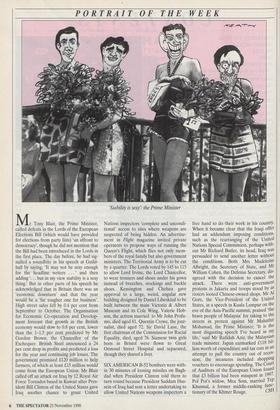PORTRAIT OF THE WEEK
`Stability is sexy': the Prime Minister r Tony Blair, the Prime Minister, called defeats in the Lords of the European Elections Bill (which would have provided for elections from party lists) 'an affront to democracy', though he did not mention that the Bill had been introduced in the Lords in the first place. The day before, he had sig- nalled a soundbite in his speech at Guild- hall by saying, 'It may not be sexy enough for the headline writers . . . ' and then adding `. . but in my view stability is a sexy thing.' But in other parts of his speech he acknowledged that in Britain there was an `economic downturn' and that the year would be a 'far tougher one for business'. High street sales fell by 0.4 per cent from September to October. The Organisation for Economic Co-operation and Develop- ment forecast that growth in the British economy would slow to 0.8 per cent, lower than the 1-1.5 per cent predicted by Mr Gordon Brown, the Chancellor of the Exchequer. British Steel announced a 24 per cent drop in profits and predicted a loss for the year and continuing job losses. The government promised £120 million to help farmers, of which at least £15 million would come from the European Union. Mr Blair called off an attack on Iraq by 12 Royal Air Force Tornados based in Kuwait after Pres- ident Bill Clinton of the United States gave Iraq another chance to grant United Nations inspectors 'complete and uncondi- tional' access to sites where weapons are suspected of being hidden. An advertise- ment in Flight magazine invited private operators to propose ways of running the Queen's Flight, which flies not only mem- bers of the royal family but also government ministers. The Territorial Army is to be cut by a quarter. The Lords voted by 145 to 115 to allow Lord Irvine, the Lord Chancellor, to wear trousers and shoes under his gown instead of breeches, stockings and buckle shoes. Kensington and Chelsea gave approval to a large, weird, angular new building designed by Daniel Libeskind to be built between the main Victoria & Albert Museum and its Cole Wing. Valerie Hob- son, the actress married to Mr John Profu- mo, died aged 81. Quentin Crewe, the jour- nalist, died aged 72. Sir David Lane, the first chairman of the Commission for Racial Equality, died, aged 76. Siamese twin girls born in Bristol were flown to Great Ormond Street Hospital and separated, though they shared a liver.
SIX AMERICAN B-52 bombers were with- in 30 minutes of loosing missiles on Bagh- dad when President Clinton told them to turn round because President Saddam Hus- sein of Iraq had sent a letter undertaking to allow United Nations weapons inspectors a free hand to do their work in his country. When it became clear that the Iraqi offer had an addendum imposing conditions, such as the rearranging of the United Nations Special Commission, perhaps with- out Mr Richard Butler, its head, Iraq was persuaded to send another letter without the conditions. Both Mrs Madeleine Albright, the Secretary of State, and Mr William Cohen, the Defense Secretary, dis- agreed with the decision to cancel the attack. There were anti-government protests in Jakarta and troops stood by as rioters looted Chinese-owned shops. Mr Al Gore, the Vice-President of the United States, in a speech in Kuala Lumpur on the eve of the Asia-Pacific summit, praised 'the brave people of Malaysia' for taking to the streets in protest against Mr Mahathir Mohamad, the Prime Minister; 'It is the most disgusting speech I've heard in rnY life,' said Mr Rafidah Aziz, the Malaysian trade minister. Japan earmarked £118 bil- lion worth of expenditure and tax cuts in an attempt to pull the country out of reces- sion; the measures included shopping vouchers to encourage spending. The Court of Auditors of the European Union found that £3 billion had been misspent in 1997. Pol Pot's widow, Mea Som, married Tel' Khunnal, a former middle-ranking fun_c" tionary of the Khmer. Rouge. CSH


















































































 Previous page
Previous page